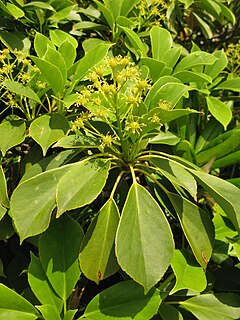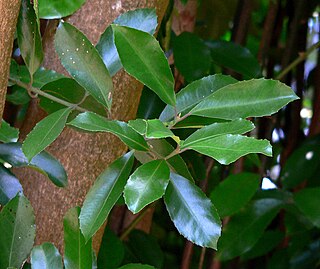A patronymic, or patronym, is a component of a personal name based on the given name of one's father, grandfather (avonymic), or an earlier male ancestor. A component of a name based on the name of one's mother or a female ancestor is a matronymic. A name based on the name of one's child is a teknonymic or paedonymic. Each is a means of conveying lineage.
Chinese surnames are used by Han Chinese and Sinicized ethnic groups in China, Taiwan, Korea, Vietnam and among overseas Chinese communities around the world. Chinese surnames are given first for names written in Chinese, which is the opposite of Western naming convention where surnames come last. Around 2,000 Han Chinese surnames are currently in use, but the great proportion of Han Chinese people use only a relatively small number of these surnames; 19 surnames are used by around half of the Han Chinese people, while 100 surnames are used by around 87% of the population. A report in 2019 gives the most common Chinese surnames as Wang and Li, each shared by over 100 million people in China, with Zhang, Liu, Chen, Yang, Huang, Zhao, Wu and Zhou making up the rest of the ten most common Chinese names.
When a person assumes the family name of their spouse, that name replaces the person's previous surname, which in the case of the wife is called the maiden name, whereas a married name is a family name or surname adopted by a person upon marriage. In Scotland it is legal and not unusual for a woman to retain her maiden name after marriage. In point of fact if a woman's family was more 'influential' than the groom then he sometimes took his bride's family name.
A surname, family name, or last name is the portion of a personal name that indicates a person's family. Depending on the culture, all members of a family unit may have identical surnames or there may be variations based on the cultural rules.

Härnösand County, or Härnösands län, was a county of the Swedish Empire, between 1645 and 1654. The seat of residence for the Governor was in Härnösand.
Spanish naming customs are historical traditions for naming children practised in Spain. According to these customs, a person's name consists of a given name followed by two surnames. Historically, the first surname was the father's first surname, and the second the mother's first surname. In recent years, the order of the surnames in a family is decided when registering the first child, but the traditional order is still largely the choice. Often, the practice is to use one given name and the first surname most of the time, the complete name being typically reserved for legal, formal, and documentary matters; however, both surnames are sometimes systematically used when the first surname is very common to get a more customized name. In these cases, it is even common to use only the second surname, as in "Lorca", "Picasso" or "Zapatero". This does not affect alphabetization: discussions of "Lorca", the Spanish poet, must be alphabetized in an index under "García Lorca" and not "Lorca".
The birth name is the name of the person given upon their birth. The term may be applied to the surname, the given name or to the entire name. Where births are required to be officially registered, the entire name entered onto a births register or birth certificate may by that fact alone become the person's legal name. The assumption in the Western world is often that the name from birth will persist to adulthood in the normal course of affairs—either throughout life, or until marriage. Some possible changes concern middle names, diminutive forms, changes relating to parental status, and changes related to gender transition. Matters are very different in some cultures in which a birth name is for childhood only, rather than for life.

Trochodendron aralioides, sometimes colloquially called "wheel tree", is a flowering plant and the sole living species in the genus Trochodendron, which also includes several extinct species. It was also often considered the sole species in the family Trochodendraceae, though botanists now include the distinct genus Tetracentron in the same family. T. aralioides is native to Japan, southern Korea and Taiwan. Growing in lower temperate montane mixed forests between in Japan, and broad-leaved evergreen forest in the central mountain ranges and Northern parts of Taiwan.

In taxonomy, an undescribed taxon is a taxon that has been discovered, but not yet formally described and named. The various Nomenclature Codes specify the requirements for a new taxon to be validly described and named. Until such a description has been published, the taxon has no formal or official name, although a temporary, informal name is often used. A published scientific name may not fulfil the requirements of the Codes for various reasons. For example, if the taxon was not adequately described, its name is called a nomen nudum. It is possible for a taxon to be "undescribed" for an extensive period of time, even if unofficial descriptions are published.

The great eared nightjar is a species of nightjar in the family Caprimulgidae. It is the largest species in the family in terms of length, which can range from 31 to 41 cm. Males weigh an average of 131 g (4.6 oz) and females weigh an average of 151 g (5.3 oz) so it the second heaviest species in the family after the nacunda nighthawk.
The Bernie Naylor Medal is an Australian rules football award which is given to the leading goalkicker at the end of each home and away season in the West Australian Football League. It is named after South Fremantle full-forward Bernie Naylor. Before the Bernie Naylor Medal, there was no physical trophy given to the competition's leading goalkicker, although there had been proposals for such a trophy to be instituted.

Hedycarya is a genus of trees and shrubs of the family Monimiaceae. Species occur in South East Asia, New Caledonia, Australia and Polynesia including New Zealand. The genus was named and formerly described in 1776 by botanists Johann and Georg Forster in Characteres Generum Plantarum . The limit of the genus may require change as it appears paraphyletic in phylogenetic analyses, with the genera Kibaropsis and Levieria nested in it.

Johann Sebastian Bach composed the church cantata Was frag ich nach der WeltBWV 94 in Leipzig for the ninth Sunday after Trinity and first performed it on 6 August 1724. It is a chorale cantata, based on the hymn by Balthasar Kindermann (1664) on a melody by Ahasverus Fritsch.
Andrew Strijk is an Australian rules footballer currently listed with the West Perth Football Club in the West Australian Football League (WAFL). He previously played with the West Coast Eagles in the Australian Football League (AFL).
The 2010 season was the West Coast Eagles' 24th season in the AFL. The Eagles finished 16th and last to record their first wooden spoon in the competition, just four years after their premiership season of 2006. West Coast played 22 games, including 12 at Subiaco Oval, winning just four and losing the remaining eighteen.
Quink is a Dutch vocal ensemble founded in 1978.
Marjon Strijk is a Dutch classical soprano. She is focused on Renaissance and Baroque music. She has recorded Bach cantatas with the Holland Boys Choir, conducted by Pieter Jan Leusink.
Kibaropsis is a monotypic genus of plant in the Monimiaceae family. It is endemic to New Caledonia. Its only species is Kibaropsis caledonica. Phylogenetic studies suggest that it is nested in the more widespread genus Hedycarya, where it has once been placed.
Strik is a Dutch surname. Its origin may be toponymic or be related to one of the meanings of the Dutch words strik or strijk. Notable people with the name include:





